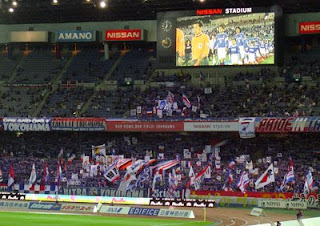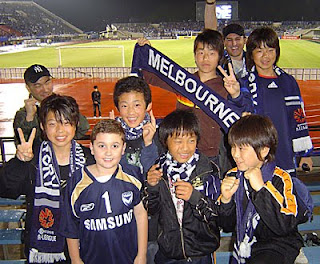No sooner does one weekend finish than another one starts.
Action from Asia’s premier domestic competition continues this weekend, with a couple of absolute beauties to look forward to.
This, again, is another of those weekends that could help shape the Championship race. By the end of it, one team could have an almost insurmountable lead. Or, the chasing pack may close the gap and the spice up the race for the title.
Whatever plays out, it’s sure to be enthralling viewing.
Sanfrecce Hiroshima vs Vissel Kobe
After a dismal showing last weekend, losing to bottom placed Kyoto Sanga 3-0, Kobe sacked under fire manager Toshiya Miura, replacing him with assistant Masahiro Wada who will become Kobe’s fourth manager in just over a year. Wada had a short stint as caretaker last season before being replaced by Miura.
 |
| Tomoaki Makino will lead Sanfrecce's defence |
Sanfrecce, by contrast, are a scene of stability. Despite not reaching the heights of last season, when they finished fourth, they have achieved a semi-final berth in the Nabisco Cup for the first time in their history.
They’ll have to play out most of the last 12 games without their key striker Hisato Sato, who is out for two months after undergoing surgery last week for a dislocated shoulder suffered in their Nabisco Cup Quarter Final victory over Gamba Osaka.
They have also struggled to score this season, with Sato having scored a third of their total goals (9 of 26). The defence has been equally stingy and young centre-back Tomoaki Makino has stood out and is creating interest amongst other J.League clubs.
But playing at home, and with Kobe a relative rabble, I expect Sanfrecce to get the job done. Although the “first game syndrome” will see Kobe put up a fight.
Prediction: Sanfrecce Hiroshima 1-0 Vissel Kobe
Jubilo Iwata vs FC Tokyo
What an important game this is for the capital club.
After a lofty finish of fifth last season, they’ve struggled to replicate that form and find themselves fair and square in the middle of a relegation battle. Fellow Tokyo side Tokyo Verdy were relegated at the end of the 2008 season and there are already crosstown jibes of a Tokyo Derby in J2 next season.
FC Tokyo currently sits in 14th spot, two places above the relegation zone, but they do so thanks only to a superior goal difference.
Their last game was a disaster in every sense, losing 0-1 to Urawa at home, but also suffering three injuries to three key players; Hideto Takahashi (out 4-8 weeks), Tatsuya Suzuki (3-4 weeks) and Naotake Hanyu (1-2 weeks).
Iwata enjoyed a confidence boosting 3-2 win over fellow strugglers Shonan Bellmare last week to put a small gap between them and the relegation battle. Another three points here would do wonders for their fight fur J1 survival, and I think they’ll get it.
FC Tokyo are a battered team at the moment, and with three key injuries, I think Jubilo will have enough to get over the capital club and plunge them further into crisis.
Prediction: Jubilo Iwata 2-1 FC Tokyo
Nagoya Grampus vs Yokohama F. Marinos
Make no mistake about it – this is the game of the weekend.
 |
Keiji Tamada will look to continue
his goal scoring form |
Nagoya is flying at the top of the table and sits a comfortable seven points clear. But doubts still remain about their title credentials, with critics claiming they struggle in “marquee games”. And there is some merit to that.
In their “marquee” games so far (those being against Gamba Osaka, Yokohama F.Marinos, Urawa Reds, Kashima Antlers, Kawasaki Frontale and Shimizu S-Pulse) they have won four, lost four and drawn one.
This game is their chance to put that record slightly in their favour and no doubt it’s something that Dragan Stojkovic will be making aware to his players. Silence the doubters and maintain, or even extend, their lead at the top. The pressure is on for Urawa.
For Yokohama, it’s all about putting themselves in the mix for a top three place. Realistically their chance for the J.League title has probably passed them by, sitting 10 points behind Nagoya. Although three points here could alter that.
But the focus for them will be on the Asian Champions League, and after two big scalps in their last two games (Albirex Niigata 3-0 and Kawasaki Frontale 2-1), they’ll be out to make it three from three and climb the table even further.
Shunsuka Nakamura will be their key man again. His combination with Koji Yamase has resulted in goals in their last two games, so Nagoya’s defence, lead by Tulio Tanaka, will need to be alert to that.
At the other end of the park, equal leading goal scorer Josh Kennedy will be looking to get back on the scoresheet after going goalless in the last two games.
This is a hard game to pick, there are compelling arguments either way, so I’ll opt for the splinters and tip a draw.
Prediction: Nagoya Grampus 1-1 Yokohama F.Marinos
Kashima Antlers vs Omiya Ardija Kashima are one of a handful of sides that could benefit if Nagoya do slip up.
Currently they sit in equal second, seven points behind the lead. But it’s been a horror six weeks for the three-time reigning champions, winning only once.
Despite a stirring win last week against Shimizu S-Pulse, however, Omiya Ardija shouldn’t cause too many problems for Kashima.
Ardija will be full of confidence after their result last week, but with Kashima at home I don’t think they can back it up two weeks in a row.
Prediction: Kashima Antlers 2-0 Omiya Ardija
Urawa Reds vs Shimizu S-Pulse Whilst not quite as big as Nagoya vs Yokohama, this one isn’t far behind.
 |
Urawa's legion of fans will be out
in force again this weekend |
S-Pulse have fallen from their lofty position earlier in the season, when they lead the J.League and took all before them. An embarrassing 0-3 loss to Omiya Ardija last weekend saw them slip outside the top three and eight points behind Nagoya. Another loss here could kill their Championship dreams.
Urawa are just playing for pride. Whilst they have a mathematical chance of an ACL spot, they sit too far behind the back to be any realistic chance. Their horror mid-season slump has cost them any chance of success this season.
They have gone some way to rectifying that in the last four weeks, with two wins and two draws. Were it not for a last second equaliser by Kashima, that would be three wins and a draw.
Despite that, immense pressure still rests on the shoulders of manager Volke Finke, with Urawa fans calling for the German to move on at the end of the season.
Despite both sides desperately needing a win, I just can’t see either side picking up all three points.
Prediction: Urawa Reds 2-2 Shimizu S-Pulse
Shonan Bellmare vs Kawasaki Frontale This one should be a relatively straight forward affair.
Shonan are struggling, sitting bottom of the pile and look like going straight back down to J2.
Kawasaki still have top three aspirations and their potency up front will easily account for Shonan, a team who has shipped 46 goals in just 22 games.
This game is being shown on Setanta Sports at 8:45am on Sunday morning.
Prediction: Shonan Bellmare 0-4 Kawasaki Frontale
Gamba Osaka vs Cerezo Osaka There are more than just local bragging rights up for grabs in this one.
Cerezo have surprised many this season, their first in J1 since 2006. Whilst the other two promoted sides (Shonan Bellmare and Vegalta Sendai) have struggled, Cerezo has flourished and look on course for a finish in the top three.
They sit in equal second and boast the best defence in the league, having conceded only 19 goals. Their Brazilian striker, Adriano, on loan from Vasco da Gama, has proved a revelation, scoring eight goals in his first season with the club.
On the other side of town, Gamba is starting to make a run for the top three after a slow start to the season.
Their clash earlier this season ended in a 1-1 draw, but on this occasion I think Gamba is going to claim bragging rights. Their attack will be too potent and will breach the Cerezo defence.
Prediction: Gamba Osaka 2-1 Cerezo Osaka
Vegalta Sendai vs Montedio Yamagata
Montedio looked to have survived their second season in J1, although they aren’t completely out of the woods just yet. A few poor results could put them back in the mix for relegation, but they should survive.
 |
| Vegalta's hardcore fans |
Vegalta, despite vociferous support from their loyal fans, have struggled for results so far this season. They have just the five wins and sit just outside the relegation zone on goal difference only.
Montedio struggle for goals, having only scored 18 so far this season.
If only for the fact they’re at home, I’m tipping Vegalta to take the three points.
Prediction: Vegalta Sendai 2-0 Montedio Yamagata
Albirex Niigata vs Kyoto Sanga The final game of the weekend sees Niigata at home for the second week running.
Their excellent mid-season run that took them from relegation threatened to a possible ACL spot, however they’ve hit a speedbump in the last two weeks, losing to both Yokohama F.Marinos and Gamba Osaka.
Kyoto, who still look likely to go down, moved themselves off the bottom of the table, albeit on goal difference, courtesy of a 3-0 over Vissel Kobe, their first win since March.
Whilst that will have provided them with a great deal of confidence, travelling to the Big Swan Stadium in Niigata will prove too tough a challenge for them as they look for back-to-back wins.
Albirex will win this one, and with some level of comfort.
Prediction: Albirex Niigata 3-0 Kyoto Sanga




















